Estate planning is about more than wills and inheritance. A binding financial agreement (BFA) can act as a planning [...]
Considering an international move? International child relocation is a big decision that could really shake up your custody and visitation arrangements. You’ll need to juggle legal requirements across different countries, which can feel a bit like spinning plates. First off, you must have the other parent’s written consent or obtain a court order before packing your bags and relocating with your child. This is crucial, as the Hague Convention is like an international watchdog, keeping an eye out for parental abductions. When you modify custody agreements, you should address time-sharing, communication, and travel expenses. Think of it like planning a long-distance relay race—everyone needs to know their part.
Navigating these complex legal and practical matters will help you safeguard your parental rights and ensure your child’s well-being. So, roll up your sleeves and dive into the details. Understanding these elements will make your transition smoother and keep everyone on the same page.
Legal Implications of International Relocation on Child Custody
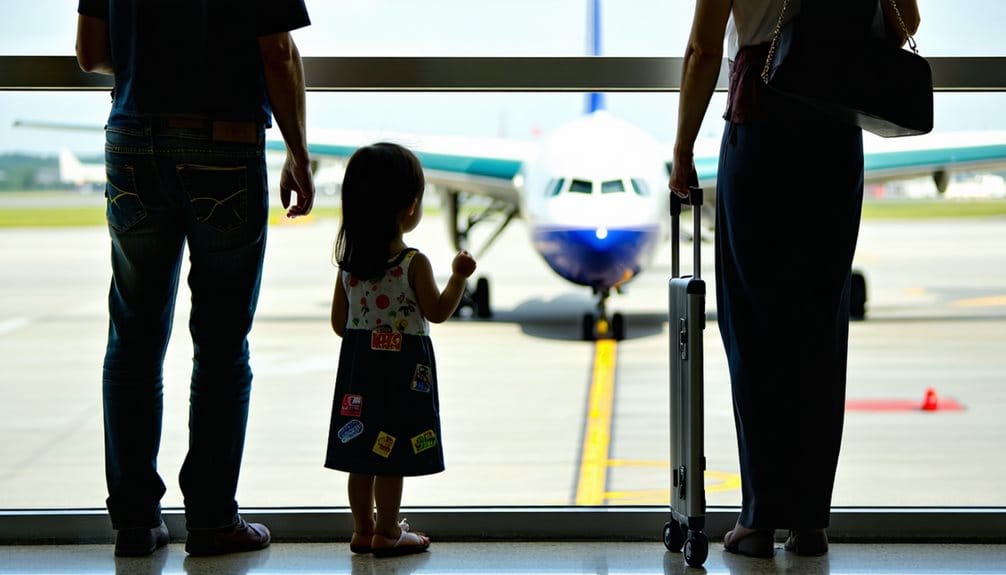
When you’re planning an international relocation with children, you’ll need to navigate complex family law regulations that govern cross-border custody arrangements and parental rights. You must obtain either written consent from the other parent or a court order modifying your existing custody agreement, as unauthorised relocation can trigger Hague Convention proceedings and legal penalties. Your custody case will face heightened scrutiny from courts in both jurisdictions, requiring you to demonstrate how the move serves your child’s best interests while maintaining meaningful contact with the non-relocating parent.
How Do Family Law Regulations Address International Relocation?
Because international relocation greatly impacts child custody arrangements, family law regulations have established strict protocols to protect children’s interests and parental rights. You’ll need to file a relocation application with the Federal Circuit and Family Court under the Family Law Act 1975. The court evaluates international child custody matters based on the child’s best interests, while the Hague Convention safeguards against situations where a child may be taken abroad without proper authorisation.
How Are Custody Agreements Modified When a Parent Relocates Internationally?
International relocation markedly alters existing custody agreements, requiring careful modification to protect both the child’s well-being and parental rights. When you relocate with the child internationally, you’ll need permission to relocate from either the other parent or court-issued relocation orders. The modified custody arrangements must specify how the child will spend time with both parents, establish communication protocols, and align with Hague Convention requirements for international parental rights.
What Legal Challenges Do Parents Face in Cross-Border Custody Cases?
Parents managing cross-border custody cases face significant legal hurdles that extend beyond typical domestic custody challenges. If you’re planning to relocate the child internationally, you’ll need to navigate both domestic and foreign laws, secure proper custody orders, and guarantee compliance with the Hague Convention. Without proper legal advice, you risk international child abduction charges, especially when moving to non-signatory countries, regardless of parental responsibility claims.
The Role of the Hague Convention in Child Relocation Cases
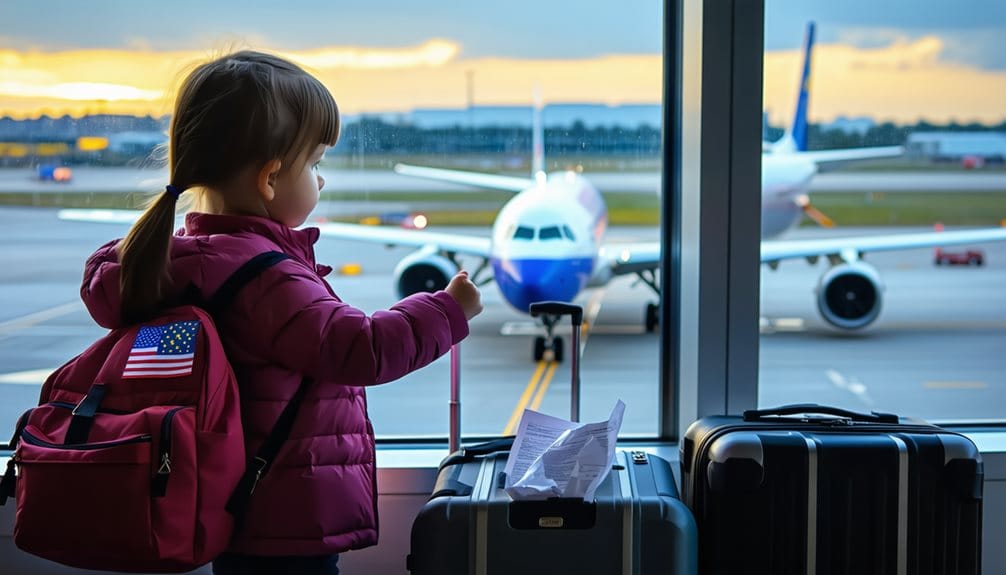
If you’re planning an international move with your child, you’ll need to understand the Hague Convention’s critical role in preventing parental abduction and protecting custody rights across borders. The Convention empowers you to secure your child’s prompt return if they’re wrongfully taken to another signatory country, establishing clear legal procedures and consequences for unauthorised relocations. You’ll face significant legal penalties if you take your child overseas without the other parent’s consent, as the Convention enforces strict protocols to maintain children’s habitual residence and preserve existing custody arrangements.
What Are the Civil Aspects of International Child Abduction?
When custody disputes cross international borders, the Hague Convention serves as a crucial legal framework to address parental child abduction. You’ll find it provides mechanisms for the return of a child to their habitual residence when wrongful removal occurs. The Convention protects visitation rights and prioritises the child’s best interests, though its effectiveness may be limited if relocation involves non-signatory countries.
How Does the Hague Convention Protect Against Child Abduction?
Building on the international framework for child protection, the Hague Convention offers specific safeguards against parental child abduction through well-defined legal procedures.
If you’re dealing with international parental abduction, the Convention enables you to seek your child’s return to their habitual residence. Australia, as a signatory country, provides legal mechanisms for enforcing custody disputes when relocation of children occurs without consent, helping prevent international child abduction through established protocols.
Legal Consequences of Taking a Child Overseas Without Consent
Parents who relocate their children overseas without proper consent face severe legal repercussions under both domestic and international law. You’ll risk parental kidnapping charges, contempt of court for violating custody orders, and intervention through the Hague Convention. Courts can issue Child Recovery Orders, place children on airport watch lists, and authorise law enforcement to retrieve them. These unauthorised relocations typically result in unfavourable custody modifications.
Legal Process for Resolving International Relocation Disputes

When you’re seeking to relocate internationally with your child, you’ll need to navigate a complex legal process that requires either the other parent’s consent or court approval. You’ll find that Australian courts weigh multiple factors, including the child’s emotional well-being, educational opportunities, and relationships with both parents before making their decision. If you can’t reach an agreement with your child’s other parent, you might consider mediation or alternative dispute resolution before proceeding to court, where a judge will ultimately determine if the move serves your child’s best interests.
Key Factors Courts Consider in Child Relocation Cases
Courts evaluate several critical factors when determining whether to permit international child relocation, as these decisions can permanently alter family dynamics and relationships. They’ll assess your reasons for the relocation, whether you’ve obtained consent, and how you’ll maintain regular contact with the child. Under family law matters, courts examine joint custody arrangements and apply the Hague Convention’s approach to relocation to protect children’s interests.
How Does the Family Court of Australia Approach These Cases?
Under Australia’s family law system, the legal process for international relocation disputes follows a structured approach that safeguards children’s interests while respecting parental rights. The Family Court of Australia evaluates relocation cases by examining parental responsibility, emotional wellbeing, and joint custody arrangements. You’ll need a custody lawyer to navigate these proceedings, as the court assesses whether the child is to be returned based on best interests principles.
What Is the Process for a Parent to Relocate with Their Child?
Before relocating internationally with a child, parents must follow a strict legal process to protect everyone’s rights and avoid serious consequences.
If you’re a parent seeking to relocate, you’ll need either written consent from the other parent or court-approved consent orders. You must demonstrate how the move serves your child’s best interests, including their emotional well-being. Without proper approval, you risk facing parental kidnapping charges and losing custody or visitation rights.
Alternative Dispute Resolution for Relocation Disputes
When parents face international relocation disputes, Alternative Dispute Resolution (ADR) offers a cooperative path to reach agreements without court intervention. Through mediation, you’ll have opportunities to negotiate custody and visitation arrangements while prioritising your child’s best interests. This process can help preserve parental relationships, minimise emotional conflict, and result in legally enforceable consent orders that benefit all parties involved.
The Importance of Legal Assistance in Child Relocation Cases
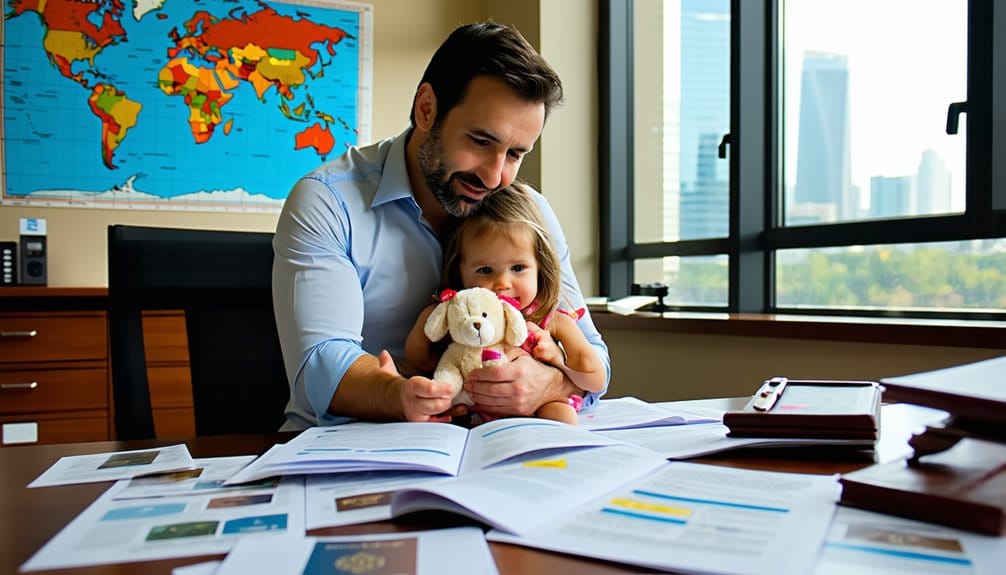
Family lawyers play an essential role in your international relocation case by ensuring you understand your legal rights and obligations while helping you navigate complex custody negotiations. You’ll need expert guidance to present compelling evidence about your child’s best interests, including factors like education opportunities, family support networks, and maintaining relationships with both parents. Your attorney can help you develop an extensive parenting plan that’ll satisfy court requirements and protect your children’s well-being throughout the relocation process.
How Can Family Lawyers Assist in Relocation Cases?
Legal representation plays an essential role in international relocation cases, as experienced family lawyers can protect your rights while guaranteeing the best interests of your child. They’ll guide you through complex custody arrangements, facilitate mediation between parents, and represent you in court proceedings when necessary. Your lawyer will also help you navigate the Hague Convention requirements and ensure compliance with both family and migration laws.
How Do Courts Determine the Child’s Best Interests in Relocation?
Building on the importance of legal representation, understanding how courts determine a child’s best interests in relocation cases helps parents prepare stronger arguments and navigate proceedings effectively.
Courts evaluate the child’s emotional and psychological wellbeing, relationships with both parents, and connection to their current home. They’ll assess the overall impact on child’s welfare, considering custody and visitation rights. If the child’s mature enough, their wishes may influence the court’s decision.
Visitation Rights and Parental Access After International Relocation

When you’re relocating internationally with children, yo u’ll need to establish a flexible visitation schedule that accounts for time zones, travel costs, and school calendars. You can protect your visitation rights by obtaining a detailed court order that specifies exact dates, communication methods, and travel arrangements for both in-person visits and virtual contact. Your legal agreement should also include provisions for emergency situations and outline how major decisions affecting the child will be made across international borders.
How Are Visitation Schedules Adjusted for International Moves?
International moves require significant adjustments to visitation schedules, as parents must balance maintaining strong relationships with their children against the practical challenges of long-distance parenting. You’ll need to establish flexible visitation arrangements that consider travel distances and the child’s best interests. Work with the non-relocating parent to create consent orders covering extended visits during school holidays, ensuring your child’s emotional well-being remains paramount.
How to Legally Protect Visitation Rights After Relocation?
To legally protect your visitation rights after relocating internationally, you’ll need a detailed court order that specifically outlines your parental access arrangements. Document your parenting plan thoroughly, including communication methods and schedules. If your child is to live abroad, make sure the agreement serves their best interests. When violations occur, you can pursue legal remedies to enforce custody arrangements or modify existing rights.
Additional Considerations in International Relocation
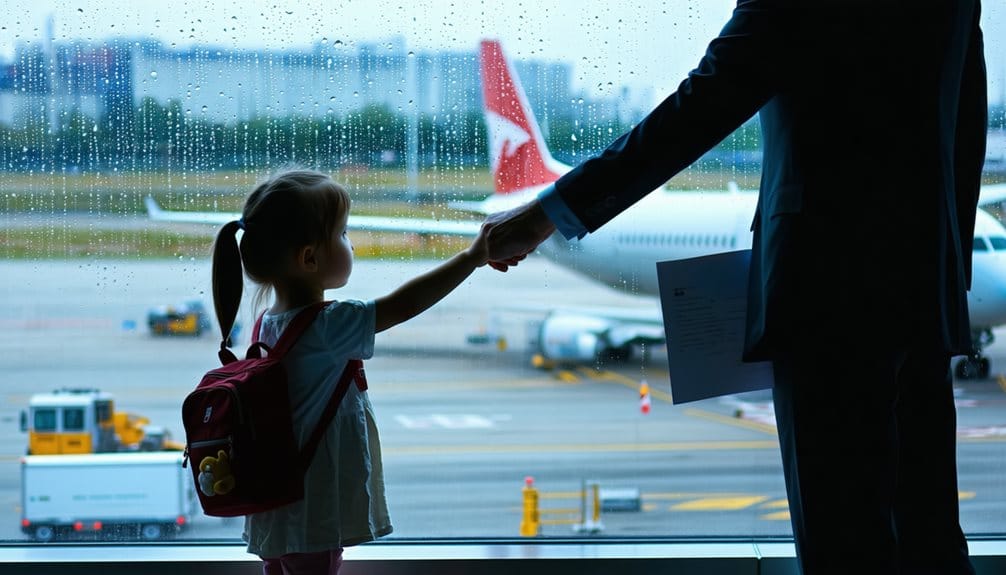
When you’re planning an international relocation with children, you’ll need to assess the substantial financial costs alongside the emotional toll of uprooting your child from their familiar environment. You should carefully evaluate the cultural differences and educational systems in the new country to guarantee they align with your child’s developmental needs and future opportunities. You’ll also want to secure legally binding international custody agreements that courts can enforce across borders, protecting both parents’ rights and establishing clear visitation schedules.
Financial and Emotional Impacts of International Child Relocation
Moving across international borders with children creates complex financial and emotional challenges that affect both parents and their kids. When relocating with a child, you’ll face increased travel costs for visitation and potential income changes. Your children may experience emotional distress from leaving familiar environments and managing split time between parents. International relocation often strains custody arrangements and everyone’s psychological well-being, requiring careful consideration of parenting dynamics.
Cultural and Educational Considerations in Child Relocation
International relocation presents unique cultural and educational challenges that require careful consideration before making such a life-changing move with your children. While exposure to new cultural experiences can enhance your child’s emotional development and identity formation, you’ll need to address potential language barriers and adjustment challenges. You must carefully evaluate educational opportunities and social experiences, ensuring thorough planning to support your child’s successful adjustment.
International Custody Agreements and Enforcement
Successfully establishing and enforcing custody agreements across borders requires careful attention to legal frameworks and parental cooperation. Your international custody agreements must explicitly address relocation rights and cross-border visitation. Under the Hague Convention, written consent is essential to prevent parental kidnapping charges. Courts prioritise the child’s best interests, so you’ll need ongoing cooperation between parents to effectively manage custody arrangements in different jurisdictions.
Conclusion: Ensuring a Fair Outcome in International Relocation Cases
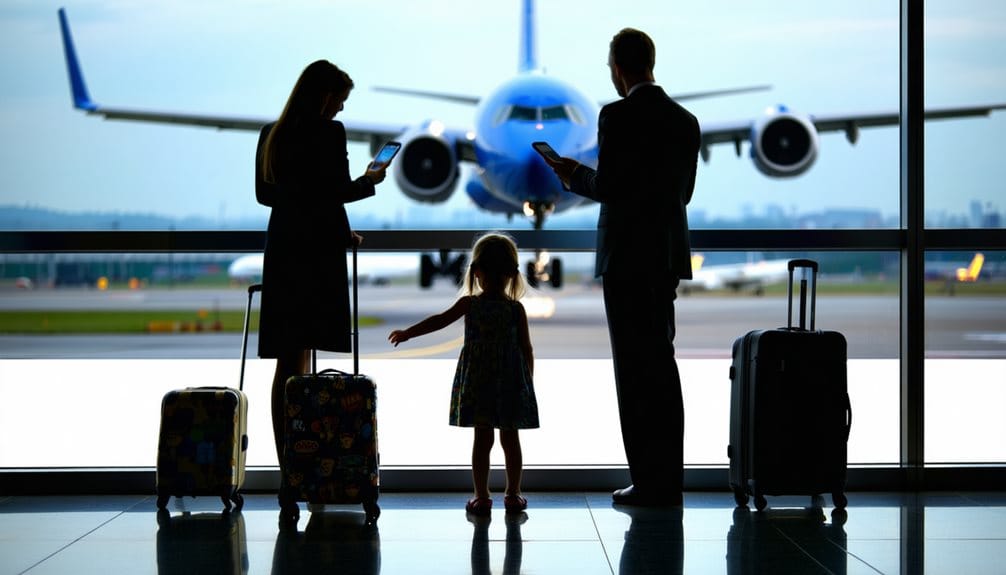
Steering international relocation cases demands a balanced approach that protects both parental rights and children’s interests. You’ll need to navigate complex custody arrangements while ensuring fair outcomes for all parties involved. When dealing with international relocation, especially in non-signatory countries to the Hague Convention, it’s essential to prioritise the best interests of the child while maintaining meaningful visitation rights for both parents.
Final Thoughts
Moving to another country with shared custody? That’s a biggie, isn’t it? Not something to rush into. You’ve got to think about legal stuff, what the courts might say, and how it’s going to affect your kiddo’s bond with both parents. Whether you’re the one packing your bags or the one staying put, make sure you chat with a good lawyer. Your rights matter, and most importantly, your child’s well-being should always be front and centre during this whole relocation thing.

























